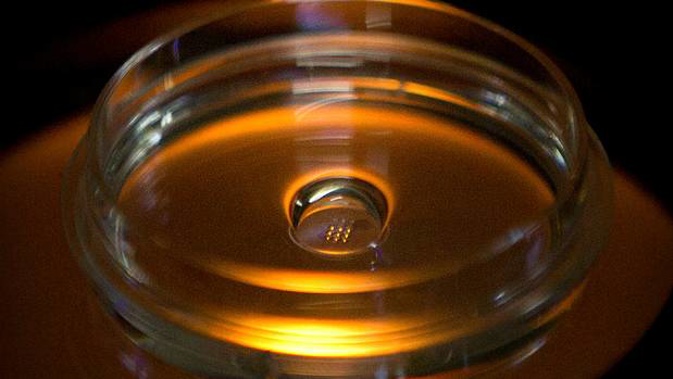
A controversial Chinese experiment aiming to produce HIV-immune children has prompted New Zealand scientists to call for tighter controls around human gene-editing.
Shenzhen-based researcher He Jiankui shocked the global science community when he announced that he'd altered embryos for seven couples during fertility treatments, with one pregnancy resulting thus far.
He said his goal was not to cure or prevent an inherited disease, but to try to bestow a trait that few people naturally have — an ability to resist possible future infection with HIV, the Aids virus.
The experiments were met with horror and outrage by many scientists, who denounced it as unethical human experimentation.
Currently, gene-editing techniques are not sufficiently safe or effective to be used on human reproductive cell lines.
Now, in a major scientific journal based in China, Otago University scientists Professor Jing-Bao Nie, Dr Simon Walker and Jing-ru Li and Chinese colleagues have laid out their specific worries about the experiment.
They also called for a more robust system of ethical governance in human gene-editing.
"The construction of regulations and laws should be accelerated to meet the rapid development of emerging biotechnologies," they said.
"The clinical application of human germline gene-editing is in the near future.
"We appeal to policy-makers to pay serious attention to the relevant issues, actively confront the challenges and come up with a responsible and feasible pathway for clinical translation of human germline gene editing."
While there was still uncertainty as to whether the scientist successfully altered the genes of three babies, the bioethicists say his actions raise a large number of serious global ethical concerns irrespective of whether they are proved correct.
These include questionable scientific and therapeutic benefits of the gene-editing, an illegitimate ethics review procedure, problems with the information and consent processes together with other procedural failings.
The scientist breached both Chinese and international ethical conventions on human gene editing.
While the genome modifying technique used (CRISPR-Cas9) is the best gene manipulation technique currently available, the Otago bioethicists say its targeting efficiency is still inadequate with other technical problems including mutations, which could cause defects, disabilities or even cancer in some cases.
"A particular concern about germline gene editing is that unintended and undesirable changes on germline cells may be passed on to offspring, which may result in unforeseen effects on future generations."
Shenzhen-based researcher He Jiankui shocked the global science community when he announced that he'd altered embryos for seven couples during fertility treatments. Photo / AP
For these reasons, the First international Summit on Human Gene Editing in 2015 agreed that it was irresponsible to proceed with human germline genome editing for clinical use at this stage, a stance which was restated at the most recent international summit.
Due to these technical limitations, China has issued several regulations prohibiting genome modification on human embryo for reproductive purpose, which were ignored by the scientist and the ethics committee he was working with.
The scientist claimed he received ethical approval for the research from a private hospital.
However, the bioethicists say the ethics committee of this hospital was not a registered committee and so its apparent approval is "all but meaningless", from a regulatory perspective.
Though the scientist gained consent from several couples for inclusion in his study, the bioethicists say the process he used is "highly questionable".
The consent form was reportedly a 23-page document written entirely in English and full of technical words, which they say it was likely that at least some of the participants would have had difficulty understanding what they were consenting to.
A requirement to pay expenses and the threat of a fine also seriously compromised the participants' freedom to withdraw from the trial and so violates the principles of voluntariness for research involving human subjects.
The Otago bioethicists say rapid development of innovative medical technology in recent years continued to generate complex ethical challenges.
"Public and academic discussion of these challenges and how they should be met, is desperately needed. We cannot rely on scientists to meet these challenges alone."
Take your Radio, Podcasts and Music with you









